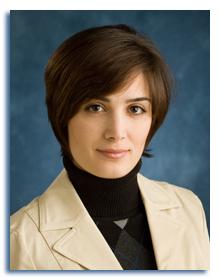Mina Rais-Zadeh receives NSF CAREER Award
Rais-Zadeh’s work will ideally yield new opportunities for acoustic devices and instrumentation.

 Enlarge
Enlarge
Mina Rais-Zadeh, assistant professor of Electrical and Computer Engineering, was recently awarded an NSF CAREER grant for her research project, “MEMS Reconfigurable Filters for Multi-Band Low-Power Radios.”
The goal of this research is to develop a single-chip reconfigurable MEMS filter platform for multi-band, multi-standard radios. This will be accomplished through the fusion of acoustoelectrically amplifed nano-mechanical filters and 3D tunable components.
This work explores a new approach to develop integrated reconfigurable filters with wide tuning range and reduced loss. This approach relies on the acoustoelectric effect, a phenomenon caused by interactions between electrons and phonons. Using this effect, which is most effective in nano-scale, a new class of nano-mechanical acoustic filters with reduced loss will be developed. This will yield new opportunities for acoustic devices and instrumentation.
Along with the experimental work, Prof. Rais-Zadeh aims to advance the scientific community’s understanding of the physical phenomena that govern the performance of these MEMS arrays and new technologies that overcome these physical limits.
Prof. Rais-Zadeh’s work could have a transformative impact on telecommunication. For example, she is developing a process that will enable on-chip reconfigurable high-Q filtering, which would eliminate redundant components currently found in RF transceivers. In a cell phone, for example, this could result in a circuit board size reduction of more than 75% and reduced power consumption. In addition, she believes that reconfigurable MEMS filters could have far-reaching applications beyond wireless communication ranging from medical ultrasonic imaging to non-contact sensing.
Prof. Rais-Zadeh’s research interests include integrated RF MEMS, MEMS-enabled ICs, wafer-level packaging and micro/nano-fabrication techniques. She has taught the junior-level course, Electronic Circuits, and the graduate level courses Advanced MEMS Devices & Technologies and Integrated Microsystems. In addition, she developed a new graduate-level course on RF MEMS which was first offered in Fall 2010. In her goal to increase diversity in engineering, she will pursue outreach in the primary and secondary grades, and involve both undergraduate and graduate students from underrepresented groups in her research.
*************************
The Faculty Early Career Development (CAREER) Award is one of the National Science Foundation’s most prestigious awards, conferred for “the early career-development activities of those teacher-scholars who most effectively integrate research and education within the context of the mission of their organization.”